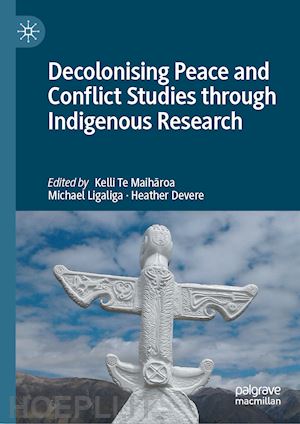
Questo prodotto usufruisce delle SPEDIZIONI GRATIS
selezionando l'opzione Corriere Veloce in fase di ordine.
Pagabile anche con Carta della cultura giovani e del merito, 18App Bonus Cultura e Carta del Docente
This book focuses on how Indigenous knowledge and methodologies can contribute towards the decolonisation of peace and conflict studies (PACS). It shows how Indigenous knowledge is essential to ensure that PACS research is relevant, respectful, accurate, and non-exploitative of Indigenous Peoples, in an effort to reposition Indigenous perspectives and contexts through Indigenous experiences, voices, and research processes, to provide balance to the power structures within this discipline. It includes critiques of ethnocentrism within PACS scholarship, and how both research areas can be brought together to challenge the violence of colonialism, and the colonialism of the institutions and structures within which decolonising researchers are working. Contributions in the book cover Indigenous research in Aotearoa, Australia, The Caribbean, Hawai'i, Israel, Mexico, Nigeria, Palestine, Philippines, Samoa, USA, and West Papua.
Chapter 1: Introduction
Kelli Te Maiharoa, Michael Ligaliga and Heather Devere
PART 1: Indigenous epistemologies, methodologies and method
Chapter 2: Decolonising Peacebuilding Research through Indigenous Knowledge Systems: Experience of Igbo Speaking group of Niger-Delta Region, Nigeria.
Chapter 3: Restoring Balance and Harmony to Peace and Conflict Studies: Engaging Indigenous Paradigm Research in Collaborations of Integrity.
Polly O Walker
Chapter 4: Affirming an Indigenous Approach within Peace and Conflict Studies.
Kelli Te Maiharoa
Chapter 5: When an Indigenous Researcher Sees, Speaks and Writes: The Experience of Palestinian Research in Israel.
Nijmeh Ali
Chapter 6: Liming and Ole Talk: A Site of Negotiation, Contestation and Relationships.
Camille Nakhid
Chapter 7: Exploring Indigenous Peace Traditions Collaboratively.
Kelli Te Maiharoa, Heather Devere, Maui Solomon and Maata Wharehoka
PART 2: Peace Education and Indigenous Research
Chapter 8: Beloved Community: Teacher reflection on Hawai?i-based teaching and learning framework, Na Hopena A?o (HA), and possible implications for decolonisation in peace studies and peace education
Kalika Kastein
Chapter 9: The Path of Education in Mexico goes back to its roots
Lucia Elena Rodríguez McKeon.
Chapter 10: Te Ao o Rongomaraeroa: Decolonising Research in a Space for Peace.
Heather Devere, Kelli Te Maiharoa and Michael Ligaliga
PART 3: Indigenous Perspectives on Peace Development and Peace Processes
Chapter 11: Decolonising the (Indonesian) ‘Peace Concept’ in West-Papua
Cahyo Pamungkas
Chapter 12: Indigenous Conflict Resolution: A Samoan Perspective.
Michael Ligaliga
Chapter 13: Treaty Making (Makarrata) and An ‘Invisible’ People: Seeking a Just Peace after Conflict.
Asmi Wood
Chapter 14: Appreciative Accompaniment and Storywork in the Philippines: Bridging Peace and Conflict Studies and Indigenous Research
Jeremy Simons
PART 4: Conclusion
Chapter 15: Conclusion: From Decolonisation to Ethical Restoration
Heather Devere, Kelli Te Maiharoa and Michael Ligaliga
Dr. Kelli Te Maiharoa (Waitaha, Ngati Rarua, Te Atiawa) has held leadership roles at the Otago Polytechnic as Tumuaki: Rakahau Maori / Director of Maori Research and Kaihautu: Te Kahui Whetu Lead / Capable Maori, working with Iwi Maori throughout Aotearoa, New Zealand. She is an active member within her whanau, Iwi and local Maori community. She is a mokopuna of Te Maiharoa, the last southern Maori prophet and tohuka (expert tribal specialist).
Dr. Michael Fusi Ligaliga is a lecturer and researcher in the School of Maori and Pacific Indigenous Studies at the University of Otago in Dunedin, Aotearoa, New Zealand. He teaches Pacific Island issues, indigenous leadership and peace and conflict in the Pacific. He has acted as Interim Director of the David O. McKay Centre for Intercultural Understanding at Brightham Young University Hawai’i.
Dr. Heather Devere is Director of Practice at the Te Ao o Rongomaraeroa/The National Centre for Peace and Conflict Studies, University of Otago in Aotearoa, New Zealand. She has written widely on issues related to the politics of friendship, Indigenous peace traditions and peacebuilding, peace journalism, restorative justice, and social justice. She is Secretary of Parihaka Network: Nga Manu Korihi, involved in community mediation, refugee settlement, human rights, and social justice issues.











Il sito utilizza cookie ed altri strumenti di tracciamento che raccolgono informazioni dal dispositivo dell’utente. Oltre ai cookie tecnici ed analitici aggregati, strettamente necessari per il funzionamento di questo sito web, previo consenso dell’utente possono essere installati cookie di profilazione e marketing e cookie dei social media. Cliccando su “Accetto tutti i cookie” saranno attivate tutte le categorie di cookie. Per accettare solo deterninate categorie di cookie, cliccare invece su “Impostazioni cookie”. Chiudendo il banner o continuando a navigare saranno installati solo cookie tecnici. Per maggiori dettagli, consultare la Cookie Policy.